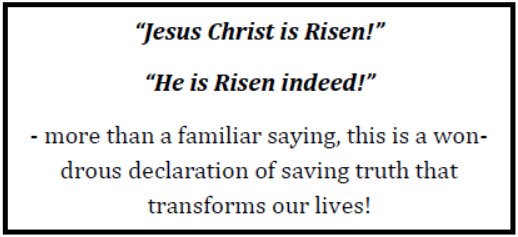
For I delivered to you as of first importance what I also received:
That Christ died for our sins in accordance with the Scriptures,
That he was buried, that he was raised on the third day in accordance with the Scriptures. (1 Corinthians 15:3-4 ESV, emphasis added)

Do you have Easter plans this year? Do those plans include more than a long-awaited family gathering and a special meal (and if you have kids, an easter basket)? As Christians we CELEBRATE the resurrection of Jesus Christ our Savior! He died on a cross, or as Peter puts it: “He himself bore our sins in his body on the tree” (1 Pt. 2:24 ESV)—then on the morning of the first day of the week (Sunday! See Luke 24:1-7), He rose from the dead, He’s alive! Death could not hold Him; in fact, the Bible testifies that the Son of God, the second Person of the Trinity, became human so “that through [his] death he might destroy the one who has the power of death, that is, the devil, and deliver all those who through fear of death were subject to lifelong slavery” (Hebrews 2:14-15 ESV). What a glorious Savior!
I am quite thankful that our culture has not totally co-opted Easter as it has done with Christmas (and even Thanksgiving). I am even more thankful that there are no major sporting events on Easter Sunday (unlike Thanksgiving and Christmas). Yes, we as Christians can enjoy the candy and decorating eggs; especially as we make wonderful memories with our children, grandchildren, or even the neighbors. But what drives the joy is the reality that Jesus Christ (bodily, physically) rose from the dead that particular (historical) Sunday morning! This objective fact is an essential (fundamental) part of the Good News (Gospel) of Christianity. Without Jesus’ crucifixion or resurrection our “faith”/religion would be worthless (see 1 Cor. 15:14-17). But since this is true, what hope we have and what a message to share!
Who delivered this Gospel truth to you?
Paul lays down several things of “first importance” in the Gospel at the beginning of First Corinthians 15 pointing to Jesus Christ’s death, burial, and resurrection (all in line with what God had said in His Word). These foundational truths were predicted in the Bible and are necessary to be believed for salvation. But notice that Paul had “received” this news and that he was faithfully “delivering” it to others (v. 3). This is not just because he was an apostle, not even just because he was a preacher; this passing along of the Good News is part of what it means to be a disciple who makes other disciples in obedience to Christ’s commission (and in dependence on His help!). We have many names that we use for this obedient work: witnessing, sharing our faith, evangelism, teaching, etc. And if you are a Christian, then you also “received” what another “delivered to you”! Give thanks to God for that faithful, obedient, person who loved you enough to point you to Jesus! But this month I’d like you to consider how you might “deliver” this message.
As a boy, I delivered newspapers (just like my Dad did when he was a lad), and I worked for UPS during my time at seminary, so this word “deliver” has a depth of meaning to me. UPS is a large company, but no matter which part of it you work in, the whole company is focused on delivering packages promptly and we were keenly aware of the competition (mostly FedEx) as well. Does the word “deliver” resonate with you in any special way? How could you use that term to help you explain what we as Christians are called to do to a new believer or a child in your family? And are you aware of the competing messages from the world?
One major contrast with what I did years ago is that I do not want to just leave something at the door and walk away as if my job is done! But I do want to treat the Gospel message as Very Important and make sure that I deliver it as best I can and as well as possible. And I want to be sure that everyone on “my route” gets it delivered to them! That’s why our family took advantage of the opportunity by the Evangelism & Outreach Committee to go on prayer walks and take copies of the letter to send our own neighbors. May God bless that churchwide endeavor!
Now, I’ve asked us to think about how we can intentionally and prayerfully “deliver” the Good News to those near to us (near to us geographically, socially, or near to our hearts), but what about those who are Far? Should we be concerned that they also get the message delivered to them? Yes, Absolutely!
This is a wonderful emphasis at LRPC—giving prayer and financial support, as well as encouraging us to know and invest in the lives and work of the missionaries we know and love. But just as UPS is a large company who cannot fulfill its mission without many people working ‘behind the scenes’, so our missionaries and mission organizations also have varied needs that we can support with our prayers and dollars. And praise the Lord for those who are using their gifts to facilitate delivering the Gospel of Jesus Christ!
JAARS1 is one such necessary organization. Connected to Wycliffe Bible Translators, JAARS offers pilot training, mission aviation services, remote technology and communications support, they “provide off-the-grid logistical solutions that help make Bible translation possible” (www.jaars.org). Several of the missionaries that we currently (or in the recent past) partnered with are working to translate God’s Word into the “heart language” (a person’s first language or native tongue) of people groups who do not have access to Scripture.2 (If you haven’t yet met them at one of our mission conferences or don’t know these folks by name, please ask one of our mission committee members for more information.)
God’s story behind the ministry of Wycliffe Bible Translators is an amazing testimony to God’s grace and power. Here is just a two-paragraph teaser:3
“In 1917 a missionary named William Cameron Townsend went to Guatemala to sell Spanish Bibles. But he was shocked when many people couldn’t understand the books. They spoke Cakchiquel, a language without a Bible. Cam believed everyone should understand the Bible, so he started a linguistics school (the Summer Institute of Linguistics, known today as SIL) that trained people to do Bible translation. The work continued to grow, and in 1942 Cam officially founded Wycliffe Bible Translators.”4
“Then in 1947 Cam’s own near-fatal aviation accident gave him fresh impetus to find a better way for translators to travel and communicate. God miraculously preserved his life and the lives of his wife, Elaine, and infant daughter, Grace, during the crash of a local single-engine plane with an inexperienced pilot. In 1948, the Wycliffe Board of Directors approved his request to establish a new service committee—Jungle Aviation and Radio Service (now known as JAARS)—to provide a safety net of air service and radios for translation workers.”5
This summer (from June 27th – July 3rd) a team from our own church will be traveling down to JAARS headquarters in Waxhaw, NC for a week of short-term mission service. We are very excited to have this opportunity! Part of the joy of this trip is the time with those who work there full time, many of them retired and continuing to serve the work of Bible translation around the world. The team will, Lord willing, have the chance to sit down over a meal or two and hear some of the stories of those who spent years working to give different tribes their own written language, teach them how to read and write, and blessing them for all eternity with God’s Word in their own heart language.
Please pray for the team; and please continue to be curious as to what God is doing to deliver the Gospel both near and far!
Thankful to be serving Christ here alongside you all,
Pastor David
NOTES:
- JAARS stands for Jungle Aviation and Radio Service and began in 1948
- “Roughly 600 million people speaking roughly 5,000 languages still have little-to-no Scripture in a language they can fully understand.” (www.jaars.org)
- The quickest way to learn more is from their websites: www.wycliffe.org, www.sil.org, and www.jaars.org. But I’d also recommend an easy-to-read biography, Uncle Cam, by James & Marti Hefley.
- About Bible Translation | Christian Missionaries | Wycliffe Bible Translators.
- COVER STORY: Seven Decades of God’s Mighty Works – JAARS.